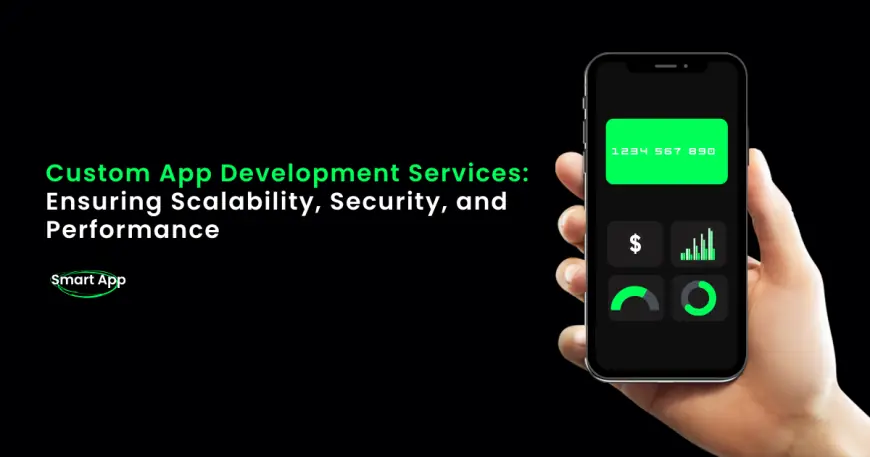Custom App Development Services: Ensuring Scalability, Security, and Performance
In this article, we’ll dive into what custom app development is, why it matters, and how businesses can benefit from it. We’ll also explore the critical aspects of scalability, security, and performance in app development, offering insights into how to ensure these features are successfully implemented in your app.

According to a recent survey, 65% of businesses report that custom software solutions have significantly improved their operational efficiency. As companies increasingly rely on mobile and web applications to meet customer demands, improve efficiency, and maintain competitiveness, off-the-shelf software often fails to address specific business needs. This is where custom app development services come into play. By opting for custom-built applications, businesses can achieve unparalleled scalability, security, and performance tailored specifically to their requirements.
What is Custom App Development?
Custom app development refers to the process of designing, building, and maintaining applications tailored to the specific needs of a business. Unlike off-the-shelf solutions, which are generalized and intended for wide use, custom apps are created with a business's unique requirements, goals, and processes in mind.
The development process usually involves a close collaboration between the development team and the client, ensuring the end product aligns perfectly with the business’s objectives. Custom app development services can encompass mobile apps, web apps, or even enterprise-grade solutions.
Why Opt for Custom App Development?
-
Unique Business Requirements: Off-the-shelf software often lacks the flexibility to meet specific business needs. With custom development, businesses can have apps that are specifically designed to meet their workflow and operational goals.
-
Competitive Advantage: A well-designed custom app can help a business stand out from competitors, providing a superior user experience and features that off-the-shelf solutions simply cannot match.
-
Greater Control: With custom development, businesses have complete control over the features, design, and functionality of the app, enabling them to make changes or upgrades as needed.
-
Cost-Effectiveness in the Long Run: While custom apps might come with higher upfront costs, they can be more cost-effective in the long term, particularly when considering reduced licensing fees and the ability to scale efficiently.
Scalability: Ensuring Growth Without Compromise
As businesses grow, so do their demands. Scalability is the capability of an app to handle increased loads and demands without compromising performance. A scalable app adapts to changes in user numbers, traffic, and data volume seamlessly, ensuring that the user experience remains smooth even as the business expands.
Key Aspects of Scalable App Development
-
Architecture Design: A solid app architecture is crucial for scalability. Using a modular design approach allows for easy addition of new features or functionalities without disrupting the overall system.
-
Cloud Integration: Cloud services offer dynamic resources that can scale up or down as needed. Integrating cloud solutions can ensure that your app can handle surges in traffic while optimizing costs.
-
Load Balancing: Distributing the load evenly across servers ensures that no single server is overwhelmed with requests, improving both performance and availability.
-
Database Optimization: A well-optimized database is essential for managing large datasets efficiently. Ensuring that the database is capable of handling growth without lag is key to achieving scalability.
-
Performance Monitoring and Analytics: Continuous monitoring and the use of analytics can help detect bottlenecks or areas for improvement, ensuring scalability is maintained even as the business grows.
How Scalability Boosts Your Business
Scalability allows businesses to grow without worrying about outgrowing their technology. For example, an e-commerce platform that can scale as traffic grows during a product launch can handle higher volumes without crashing, resulting in better customer experiences and greater revenue.
Security: Safeguarding Sensitive Data and User Trust
Security is one of the foremost concerns in app development, particularly with the rise of data breaches and cyberattacks. Custom app development provides businesses the ability to implement robust security measures tailored to their specific needs.
Essential Security Measures for Custom Apps
-
Data Encryption: Encryption ensures that sensitive data, such as customer information and financial details, is protected from unauthorized access, both at rest and during transmission.
-
Two-Factor Authentication (2FA): Implementing 2FA adds an additional layer of security, reducing the risk of unauthorized access to user accounts.
-
Regular Security Audits: Periodic security audits can help identify vulnerabilities and ensure that the app remains secure against emerging threats.
-
Role-Based Access Control: By restricting access to sensitive data and features based on user roles, businesses can minimize the risk of insider threats and unauthorized access.
-
Secure APIs: Custom apps often integrate with third-party APIs. Ensuring these APIs are secure and implementing authentication mechanisms is vital for maintaining the integrity of the app.
Why Security is Critical for Custom Apps
Data breaches not only damage a company’s reputation but also lead to significant financial losses and legal repercussions. A secure app fosters user trust and ensures that sensitive information is protected, which is crucial in industries like healthcare, finance, and e-commerce, where security is a top priority.
Performance: Ensuring Fast and Reliable User Experience
Performance is another critical factor that determines the success of a custom app. Slow-loading apps or those that are prone to crashes can lead to poor user experiences and result in high abandonment rates.
Key Factors Affecting App Performance
-
App Load Time: Users expect apps to load quickly. Ensuring that the app is optimized for speed, even in high-traffic conditions, is essential for providing a smooth user experience.
-
Responsive Design: Whether accessed on a mobile device or desktop, an app should offer a seamless experience across different screen sizes. A responsive design ensures that the app adapts to various devices without compromising performance.
-
Efficient Code and Algorithms: Well-written, optimized code ensures the app runs efficiently without unnecessary delays. Code optimization can significantly reduce load times and improve overall performance.
-
App Caching: Caching commonly accessed data reduces the need for repeated server requests, enhancing app performance and user satisfaction.
-
Error Handling and Recovery: Apps should be designed to handle errors gracefully. Well-implemented error handling ensures that the app continues to function even when unexpected issues arise, enhancing reliability.
How Performance Impacts User Retention
A performant app keeps users engaged and reduces the likelihood of churn. According to research, users are more likely to abandon an app if it takes longer than 3 seconds to load. By ensuring your custom app performs optimally, you increase the chances of retaining users and turning them into loyal customers.
The Custom App Development Process
Developing a custom app involves several stages, each critical to ensuring scalability, security, and performance. Here's an overview of the typical process:
-
Requirement Gathering: The first step is to understand the business's needs, objectives, and pain points. The development team collaborates closely with the client to define the app's functionality, features, and design.
-
UI/UX Design: Designing the app’s user interface and experience is crucial for user retention. The design should be intuitive, engaging, and aligned with the brand’s identity.
-
Development: During this phase, the actual coding and development of the app take place. The focus is on building a scalable and secure app with optimal performance.
-
Testing: Rigorous testing is conducted to ensure the app is free of bugs, works across different devices and platforms, and performs under stress.
-
Deployment: Once the app passes testing, it is deployed to the appropriate app stores or hosted on a web server, depending on its type.
-
Maintenance and Updates: Ongoing maintenance ensures that the app continues to perform well, remains secure, and is updated with new features as business needs evolve.
Choosing the Right Custom App Development Partner
Selecting the right custom app development service provider is crucial to the success of your project. Here are some factors to consider when making your choice:
-
Expertise and Experience: Look for a development team with a proven track record in building scalable, secure, and high-performance apps.
-
Customization Ability: The development team should be able to tailor the app to your specific business needs and goals.
-
Support and Maintenance: Choose a provider who offers ongoing support and maintenance to keep your app running smoothly.
-
Technology Stack: Ensure that the development team uses up-to-date technologies that support scalability, security, and performance.
-
Portfolio and Reviews: Review the provider's portfolio and client testimonials to gauge their experience and reputation in the industry.
Conclusion
Custom app development offers businesses the ability to create solutions that are scalable, secure, and high-performing. By working with the right development team, businesses can ensure their apps meet the specific needs of their operations while delivering exceptional user experiences. Whether you're aiming to grow your customer base, improve internal efficiency, or protect sensitive data, a custom-built app provides the flexibility and functionality required to achieve these goals.
What's Your Reaction?
 Like
0
Like
0
 Dislike
0
Dislike
0
 Love
0
Love
0
 Funny
0
Funny
0
 Angry
0
Angry
0
 Sad
0
Sad
0
 Wow
0
Wow
0




















































